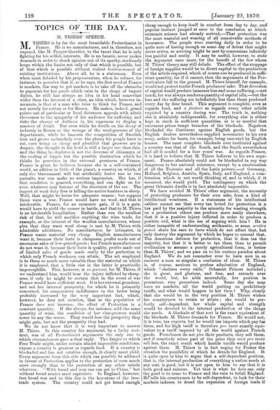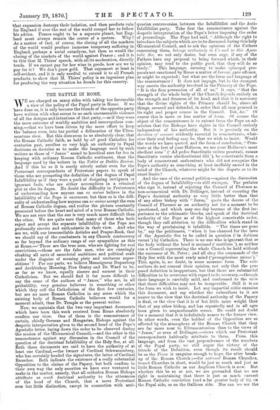TOPICS OF THE DAY.
M. THIERS' SPEECH.
MTHIERS is by far the most formidable Protectionist in e France. He is no manufacturer, and is, therefore, not exposed, like M. Pouyer-Quertier, to the taunt that he is only fighting for his selfish interests. He is no fanatic, never makes demands in order to shock opinion out of its apathy, studiously keeps within the limits not only of that which is possible, but of that which is possible without violent bouleversement of existing institutions. Above all, he is a statesman. Even when most deluded by his prepossessions, when he refuses, for instance, to perceive that if, as he says, the first need of France is markets, the way to get markets is to take off the obstacles to payment for her goods which exist in the shape of import duties, he still has always an idea in his head somewhat wider than the interest of a class, an idea which, however in- accurate, is that of a man who tries to think for France, and not merely for cotton or for Rouen. He makes, indeed, grand points out of particular or local distresses, appeals with adroit cleverness to the sympathy of his audience for suffering, and risks the charge of dullness in his eagerness to display a mastery of detail. But even while he dwells on the decay of industry in Rouen or the wrongs of the wool-growers of the departments, while he laments the competition of Swedish iron and grows melancholy over the plenty his people have to eat, corn being so cheap and plentiful that growers are in despair, the thought in his head is still a larger one than this, and the thing he deplores is not the decrease of chimneys, or the cooling of forges, but the possible diminution which he thinks he perceives in the external greatness of France. France is great, he believes, because she is a self-contained world, an edition in little of the planet, a country on which, if only the Government will but artificially foster one or two pursuits, war can make no serious impression. She has, if that condition is granted, everything, and can fight on for ever, whatever may become of the dominion of the sea. The import of wool duty free is killing the native business in sheep. Well, that might be borne for adequate reason ; but suppose there were a war, France would have no wool, and that is intolerable. France, for an economic gain, if it is a gain, would have to yield the sooner in battle, and that to M. Thiers is an intolerable humiliation. Rather than run the smallest risk of that, he will sacrifice anything, the wine trade, for example, or the interest of the woollen manufacturers, whose plea that they want wool cheap is met by M. Thiers with admirable adroitness. No manufacturer, he intimates, in France wants material very cheap. English manufacturers want it, because their forte is cheapness, profits made out of enormous sales of low-priced goods ; but French manufacturers do not want it, because their forte is quality, profits made out of limited sales of goods made costly by the perfection to which only French workmen can attain. The art employed is to them so much more valuable than the material on which it is employed, that a little rise in the latter is practically imperceptible. This, however, is en passant, for M. Thiers, if we understand him, would bear the injury inflicted by cheap- ness, if only he might be certain that in the event of war France would have sufficient wool. It is her external grandeur, and not her internal prosperity, for which he is primarily concerned, his comparative indifference to the latter being probably increased by the very important fact, which, however, he does not mention, that as the population of France does not increase, the effect of Protection is a constant quantity. If she always, for instance, sold the same quantity of wine, the condition of her vine-growers would never be any the worse. They would lose the prosperity they might gain, but not the prosperity they had. We do not know that it is very important to answer M. Thiers. In this country his argument, by a lucky acci- dent, was of all Protectionist arguments the only one to which circumstances gave a final reply. The danger to which Free Trade might, under certain almost impossible conditions, expose a country is greatest as regards food. If a country is blockaded and has not eatables enough, it clearly must yield. Every argument from this side which can possibly be adduced in favour of Protection applies to the protection of corn much more strongly than to the protection of any other article whatever. "With bread and iron one can get to China," but without bread armies must capitulate. In England, however, free bread was and to this day is the key-stone of the free- trade system. The country could not get bread enough
cheap enough to keep itself in comfort from day to day, ancY popular instinct jumped at once to the conclusion at which. economic science had already arrived,—That protection was. the most wasteful and wearing of all conceivable methods of insurance. The people were starving daily in order to be quite sure of having enough on some day of defeat that might. never arrive, or arriving might be met by concessions infinitely
less painful and costly. It may be useful, however, to state- the argument once more, for the benefit of the few whom_ M. Thiers' theory may still delude. The effect of the stoppage of foreign supplies would be to divert capital to the production, of the article required, which of course can be produced in suffi- cient quantity, for if it cannot, then the arguments of the Pro- tectionists fall to the ground. M. Thiers himself, for example,. would not protect teafor French producers' sake. That diversion,
of capital would produce immense loss and some suffering,—not much, for war always renders aquantity of capital idle,—but the
loss and the suffering are indefinitely less than those produced every day by dear bread. This argument is complete, even as regards food, and a fortiori as regards every other article required by a country during war. The truth is, nothing else is absolutely indispensable, for everything else is either
kept in stock in sufficient quantities, or is so needful that enormous prices tempt breaches of the blockade. Napoleon blockaded the Continent against English goods, but the English dealers nevertheless supplied necessaries to his own army, orders for boots, for example, being executed by English houses. The most complete blockade ever instituted against a country was that of the South, and the South nevertheless had all it needed for a four years' war. As regards France, it is hard to believe that M. Thiers believes in his own argu- ment. France absolutely could not be blockaded in any way dangerous to her national existence, except by a combination- of all the Teutonic and all the Latin powers,—of Germany, Holland, Belgium, Austria, Spain, Italy, and England, a com- bination which is not worth thinking of, and to which, if it occurred, she would yield. The contingency on which the great Orleanist dwells is in fact absolutely impossible.
We have avoided M. Thiers' other argument, the necessity of protecting producers for their own sake, from a kind of intellectual weariness. If a statesman of his intellectual
calibre cannot see that every tax levied for protection is a
tax paid by the majority to the minority for wasting strength on a production others can produce more easily elsewhere,.
that it is a positive injury inflicted in order to produce a.
positive evil, what is the use of arguing with him? He is. either incapable of understanding arithmetic, or some arrihre pense'e shuts his ears to facts which do not affect that, but
only destroy the argument by which he hopes to conceal that. The American defence for protection, that it does tax the majority, but that it is better to tax them than to permit civilization to assume a purely agricultural form, is better than M. Thiers', and we pass on to his curious paradox about England. We do not remember ever to have seen in so eminent a man so singular a confusion of ideas. M. Thiers is, of course, anxious to profess admiration of England, which "shelters every exile," Orleanist Princes included ; she is great, and glorious, and free, and extends over the world, but, he adds mournfully, her position is precarious, very precarious indeed. Some day she may have no markets, all the world putting on prohibitory tariffs, and what would happen to her then ? Why, clearly
that she would be in the very position M. Thiers wishes his countrymen to retain or attain ; she would be per- fectly self -dependent, her whole capital and strength would be devoted to the internal production of the things she needs. A blockade of that sort is the exact equivalent of the blockade M. Thiers demands for France. He would not, it is true, tax exports, but he would tax imports which pay fog. them, and his high tariff is therefore pro tanto exactly equi- valent to a tariff imposed by all the world against French goods. Frenchmen do not give their products, they sell them, and if somebody seizes part of the price they must pro tank. sell less, the exact result which hostile tariffs would produce against them. M. Thiers is in fact urging for France the situation the possibility of which he dreads for England. It is quite open to him to argue that a self-dependent position, that is, the internal production of everything a nation needs at any cost, is good, but it is not open to him to say that it is both good and ruinous. Yet that is what he does say, only the good is to come to France and the ruin to befall England. He'tells his countrymen to be self-dependent, to look for their markets indoors, to dread the expansion of foreign trade if that expansion destroys their isolation, and then predicts ruin -for England if ever the rest of the world compel her to follow his advice. France ought to be a separate planet, but Eng- land must always remain the centre of a system. Why ? As a matter of fact, of course, the closing of all the markets -of the world would produce immense temporary suffering in England, perhaps a social cataclysm, but then so would the 'closing of the markets of the world against France ; and it is -to this that M. Thiers' speech, with all its moderation, directly -tends. If we cannot pay for her wine in goods, how are we to pay for it ? We don't grow gold. That argument at least is self-evident, and it is only needful to extend it to all French -products, to show that M. Thiers' policy is an ingenious plan for producing the very situation he dreads for this country.



































 Previous page
Previous page